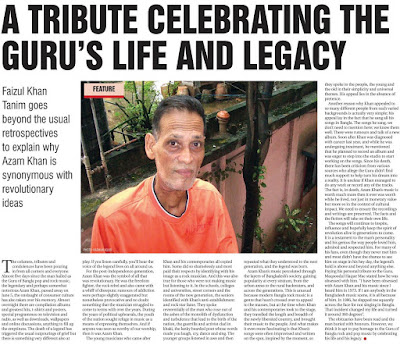Azam Khan - A tribute celebrating the Guru’s life and legacy

A tribute celebrating the Guru’s life and legacy
Faizul Khan Tanim goes beyond the usual retrospectives to explain why Azam Khan is synonymous with revolutionary ideas
Almost overnight there are compilation albums and greatest hits, t-shirts and posters, special programmes on television and radio, as well as downloads, wallpapers and online discussions, anything to fill up the emptiness. The death of a legend has triggered the usual outpourings of grief but there is something very different also at play. If you listen carefully, you’ll hear the voice of the legend lives on all around us.
For the post-Independence generation, Azam Khan was the symbol of all that was revolutionary. He was the freedom fighter, the rock rebel and also came with a whiff of disrepute; rumours of addiction were perhaps slightly exaggerated but nonetheless provocative and no doubt something that the musician struggled to come to terms with over the years. During the years of political upheavals, the youth of the nation sought refuge in music as a means of expressing themselves. And if anyone was seen as worthy of our worship, then it was Azam Khan.
The young musicians who came after Khan and his contemporaries all copied him. Some did so shamelessly and most paid their respects by identifying with his image as a rock musician. And this was also true for those who were not making music but listening to it.
In the schools, colleges and universities, street corners and the rooms of the new generation, the seniors identified with Khan’s anti-establishment and rock star fame. They spoke reverentially of the man who rose out of the ashes of the monolith of dysfunction and turbulence that lead to the birth of the nation, the guerrilla and activist clad in khaki, the lanky bearded poet whose words made you laugh, cry, dance and sing. The younger groups listened in awe and then repeated what they understood to the next generation, and the legend was bor
Azam Khan’s music percolated through the layers of Bangladesh’s society, gaining popularity at every stratum, from the urban areas to the rural backwaters, and across the generations. This is unusual because modern Bangla rock music is a genre that hasn’t crossed over to appeal to the masses, but at the time when Khan and his contemporaries took to the stage, they travelled the length and breadth of the newly liberated country, and brought their music to the people. And what makes it even more fascinating is that Khan’s songs were often improvised and written on the spot, inspired by the moment, so they spoke to the people, the young and the old in their simplicity and universal themes. His appeal lies in the absence of pretence.
Another reason why Khan appealed to so many different people from such varied backgrounds is actually very simple; his appeal lay in the fact that he sang all his songs in Bangla. The songs he sang, we don’t need to mention here; we know them well.
There were rumours and talk of a new album. Soon after Khan was diagnosed with cancer last year, and while he was undergoing treatment, he mentioned that he planned to record an album and was eager to step into the studio to start working on the songs. Since his death, there has been criticism from various sources who allege the Guru didn’t find much support to help turn his dream into a reality. It is unclear if Khan managed to do any work or record any of the tracks. The fact is, in death, Azam Khan’s music is worth much more then it ever was worth while he lived, not just in monetary value but more so in the context of cultural impact. We need to ensure the recordings and writings are preserved. The facts and the fiction will take on their own life.
The songs will continue to inspire, influence and hopefully keep the spirit of revolution alive in generations to come. It is a testament to the man’s personality and his genius the way people loved him, admired and respected him.
For many of his fans, even though they never met him and most didn’t have the chance to see him on stage in his hey day, the legend’s hold is above and beyond anything else. Paying his personal tribute to the Guru, Maqsoodul Haque Mac stated how he was obsessed with him. “I have been obsessed with Azam Khan and his music since I heard him in 1973. If I am anybody in the Bangladesh music scene, it is all because of him. In 1986, he slapped me squarely across the face for not singing in Bangla. That incident changed my life and turned it around 360 degrees”.
The obituaries have been read and the man buried with honours. However, we think it is apt to pay homage to the Guru of Bangla rock and pop music by celebrating his life and his legacy.


Comments
Despite the fact that it uses concrete,
an unfriendly environmental material, it has a few advantages over tires and shares most
of the earthship advantages. Say we are laying out a simple
home 30' x 45'; if the last dimension was forty feet instead of forty-five
then the cross corner measurement would be fifty feet.
commercial fertilizers or pesticides can cause health problems.
They don't control every bad bug, but it will help you have better success gardening. Again, using companion planting techniques will help your organic garden flourish.
Take a look at my blog post :: transmogrify